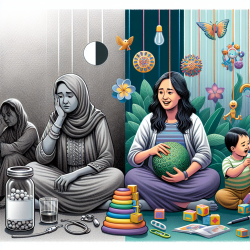Understanding the Impact of Maternal Depression on Child Development
As a practitioner working with children, understanding the underlying factors that affect their emotional and behavioral development is crucial. One significant factor that has come to light is maternal depression during pregnancy. Research has shown that children of mothers who experience depression during pregnancy are at a higher risk of developing emotional and behavioral issues, such as anxiety, depression, and attention problems, which can persist into adolescence and beyond.
The Role of Early Intervention
Early intervention is key in mitigating these adverse outcomes. A recent study titled "Early intervention to prevent adverse child emotional and behavioural development following maternal depression in pregnancy: study protocol for a randomised controlled trial" explores the effectiveness of cognitive behavioral therapy (CBT) in treating antenatal depression and its impact on child development.
Key Findings from the Study
The study involved pregnant women diagnosed with a depressive disorder and compared those who received an 8-week structured CBT program with those who received treatment as usual. The primary outcome measured was the child's emotional and behavioral development at 24 months, using the Child Behaviour Checklist (CBCL).
- Children whose mothers received CBT showed significant improvements in internalizing behaviors such as anxiety and depression.
- There were also positive effects on externalizing behaviors, cognitive development, and motor skills.
- The study suggests that treating maternal depression during pregnancy can prevent or reduce adverse child developmental outcomes.
Implications for Practitioners
For practitioners, these findings underscore the importance of early intervention and the potential benefits of integrating psychological treatments for expectant mothers into standard antenatal care. Here are some practical steps you can take:
- Advocate for Early Screening: Encourage early screening for depression in pregnant women and collaborate with healthcare providers to ensure timely interventions.
- Promote CBT Programs: Support the implementation of CBT programs for pregnant women diagnosed with depression. This can be done through partnerships with mental health professionals and organizations.
- Educate Parents: Provide resources and information to expectant parents about the impact of maternal mental health on child development and the importance of seeking help.
Encouraging Further Research
While this study provides valuable insights, further research is needed to explore the long-term effects of treating maternal depression on child development. Practitioners can contribute to this body of knowledge by participating in research initiatives and sharing their findings with the broader community.
To read the original research paper, please follow this link: Early intervention to prevent adverse child emotional and behavioural development following maternal depression in pregnancy: study protocol for a randomised controlled trial.










